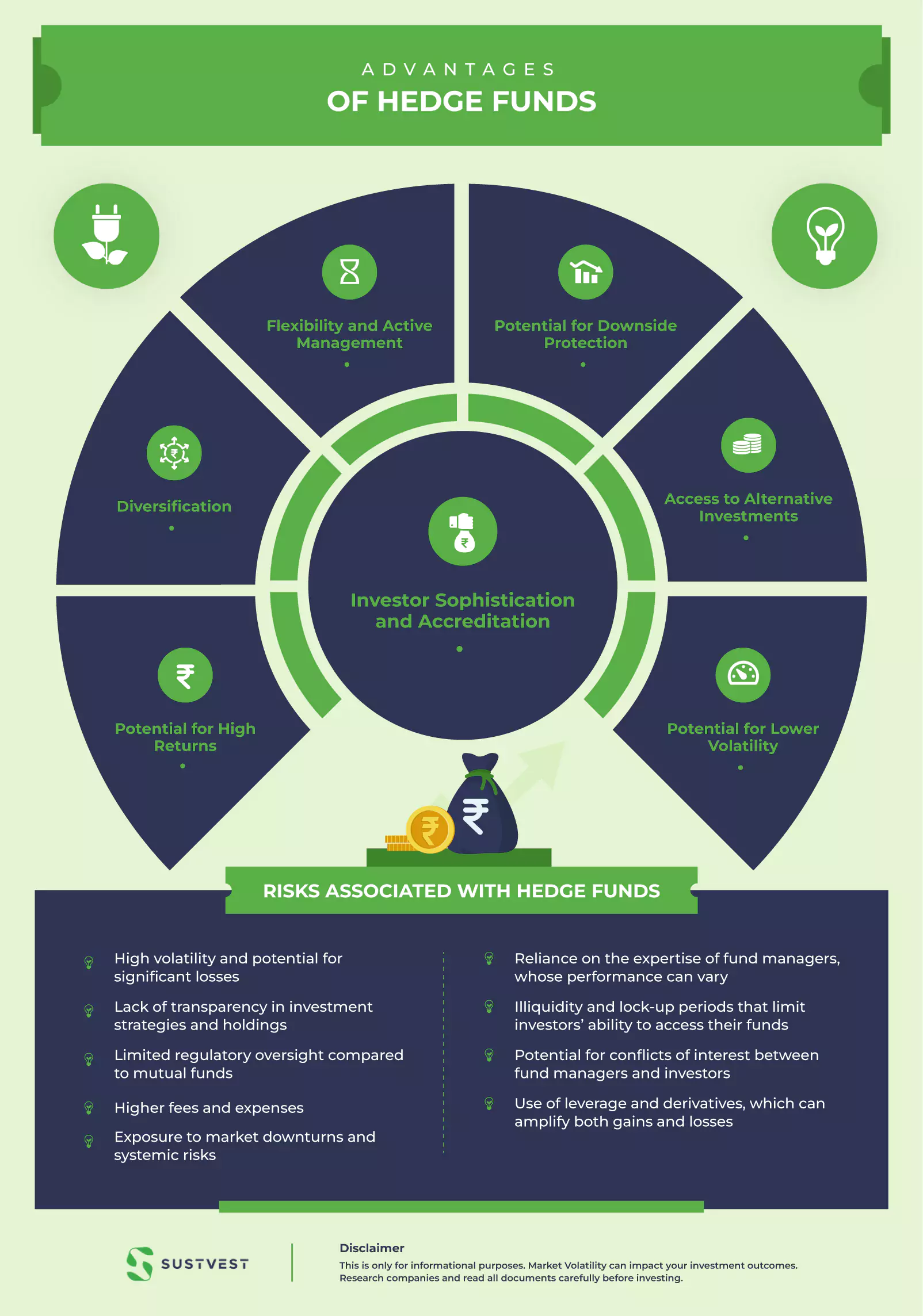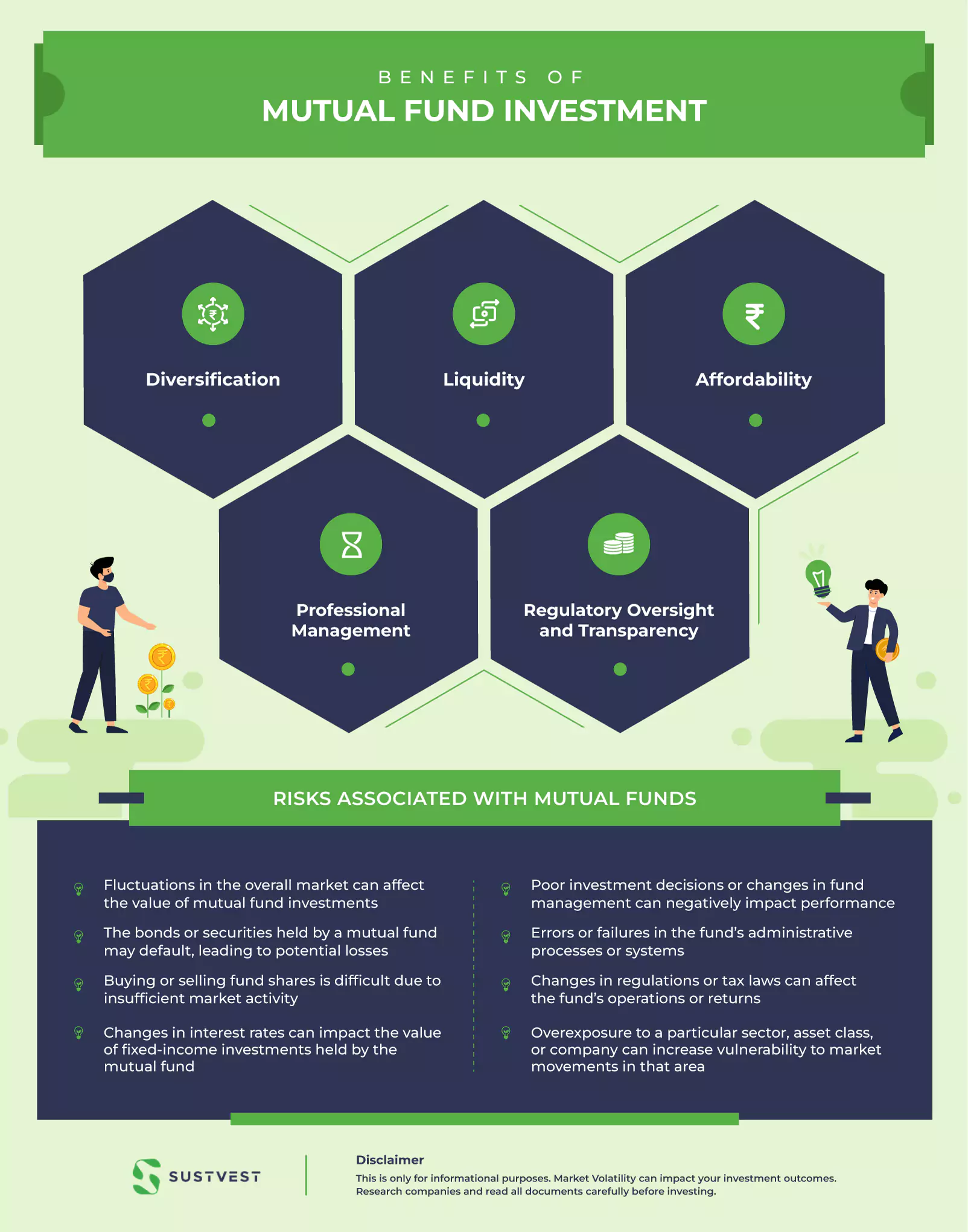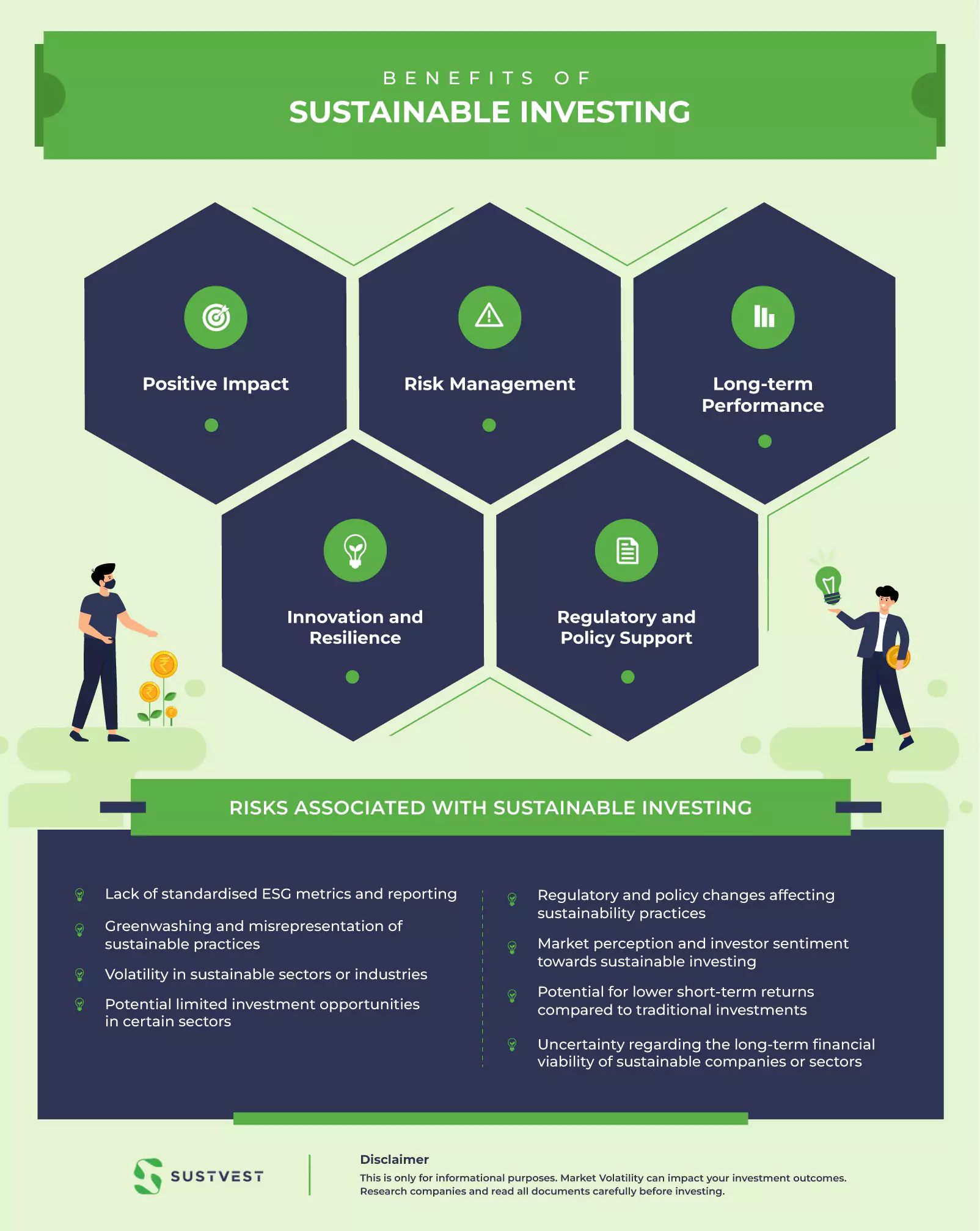Three approaches have gained prominence in recent years: hedge funds, mutual funds, and sustainable investing. Understanding the benefits, returns, and risks associated with these options becomes crucial as investors increasingly prioritize ethical and environmentally conscious investments. So let’s know the difference between Hedge funds vs mutual funds vs sustainable investing.
Hedge funds, known for their risky tactics, seek huge profits. On the other hand, mutual funds offer diversified portfolios and the potential for long-term growth. Meanwhile, sustainable investing combines financial goals with positive social and environmental impacts.
This article differentiates between Hedge funds vs Mutual funds vs Sustainable investing while exploring the growing importance of sustainable investing in today’s financial landscape.

What are Hedge Funds?
Hedge funds are investment vehicles that pool funds from wealthy individuals and institutional investors. Managed by professional fund managers, hedge funds employ various complex and aggressive investment strategies to achieve high returns.
Hedge funds are less regulated than mutual funds and can invest in stocks, bonds, derivatives, and alternative investment options. They often use leverage and employ hedging techniques to generate profits in both rising and falling markets.
Advantages of Hedge Funds
Hedge funds have the objective of absolute profitability and low correlation with traditional assets or indices. They use various strategies to achieve this, such as leveraging, short selling, and derivatives trading.
These strategies can potentially generate returns in all market phases, making them attractive to investors. However, the risk of investing in a hedge fund should be considered, as it depends on indicators such as volatility and the symmetry or asymmetry of returns.
Here are some of the Main Advantages of Hedge Funds:
Potential for High Returns:
Hedge funds can make a lot of money because they spend in risky ways. They can use complicated and non-traditional ways to invest, like short selling, leverage, and derivatives, to take advantage of market opportunities and possibly do better than traditional ways to invest.
Diversification:
Hedge funds often maintain diversified portfolios across different asset classes, industries, and geographic regions. This diversification helps reduce the risk associated with investing in a single company or sector, providing potential stability during market downturns.
Flexibility and Active Management:
Hedge funds offer greater flexibility compared to traditional investment vehicles. Fund managers have the ability to adapt quickly to changing market conditions, adjust their strategies, and explore alternative investment opportunities. This active management approach allows for potential capital appreciation and risk mitigation.
Potential for Downside Protection:
Hedge funds can employ various risk management techniques, such as hedging and short selling, to potentially protect the portfolio from downside market movements. These strategies aim to limit losses during market downturns and preserve capital.
Access to Alternative Investments:
Hedge funds provide unique investment opportunities that normal investors don’t. This may involve private equity, real estate, commodities, or distressed stocks. Hedge funds may improve returns and minimise risk by diversifying into different investments.
Investor Sophistication and Accreditation:
Hedge funds typically cater to sophisticated and accredited investors who meet certain wealth and income criteria. This exclusivity allows for a more tailored investment approach, specialised strategies, and the ability to access complex investment opportunities.
Potential for Lower Volatility:
Through their active management and risk mitigation techniques, hedge funds aim to achieve lower volatility compared to traditional investment options. This can be particularly attractive to investors seeking stable returns and capital preservation.
Returns on Hedge Funds
Returns on hedge funds can vary significantly due to their aggressive and alternative investment strategies. Hedge funds aim to generate high returns by leveraging techniques such as short-selling, derivatives, and leverage.
While some hedge funds have achieved impressive gains, others have experienced substantial losses. The potential for higher returns comes with increased risk and volatility, making hedge funds suitable for sophisticated and high-risk-tolerant investors.
Risks Associated with Hedge Funds
Hedge funds are famous in the financial sector due to their high returns and diversity. However, these investment vehicles have risks that must be considered. Hedge fund investors must understand and manage these risks.
- High volatility and potential for significant losses
- Lack of transparency in investment strategies and holdings
- Limited regulatory oversight compared to mutual funds
- Higher fees and expenses
- Reliance on the expertise of fund managers, whose performance can vary
- Illiquidity and lock-up periods that limit investors’ ability to access their funds
- Potential for conflicts of interest between fund managers and investors
- Use of leverage and derivatives, which can amplify both gains and losses
- Exposure to market downturns and systemic risks

What are Mutual Funds?
Mutual funds aggregate money from various investors to build a diversified portfolio of stocks, bonds, or both. They’re handled by professional fund managers who invest investors’ money.
Each mutual fund owner owns a percentage of the portfolio. Individual investors can benefit from economies of scale and long-term growth with professionally managed and diversified mutual funds.
Benefits of Mutual Fund Investment
Mutual fund investment has several benefits, but we will focus on some of its major benefits.
Diversification:
Mutual funds offer investors the benefit of diversification by investing in a wide range of securities across different sectors, industries, and asset classes. This diversification helps to spread out investment risk and reduce the impact of individual security fluctuations.
Professional Management:
Mutual funds are managed by experienced and skilled fund managers who conduct thorough research and analysis to make investment decisions on behalf of investors. Their expertise and knowledge can potentially lead to better investment choices and optimised portfolio performance.
Liquidity:
Investors can simply buy or sell mutual fund shares at the end of each trading day. This makes mutual funds a simple and flexible investment option because investors may access their investment capital promptly and effectively.
Affordability:
Mutual funds feature minimal minimum investments, making them accessible to many investors. Investors can also invest disciplined over time by contributing smaller amounts at regular intervals through systematic investing strategies.
Regulatory Oversight and Transparency:
Financial officials regulate mutual funds, which helps protect investors and ensure they follow industry standards. Investors can make informed selections based on fund managers’ regular updates, reports, and disclosures.
Returns on Mutual Funds
The performance of the fund’s portfolio securities determines mutual fund returns. The mutual fund’s NAV fluctuates with the value of the securities. Capital appreciation (growth in assets value) and income (dividends or interest payments) can generate mutual fund returns.
Mutual fund returns fluctuate depending on market conditions, investing strategy, and fund management expertise. It’s crucial to remember that past success doesn’t guarantee future returns.
Risks Associated with Mutual Funds
- Fluctuations in the overall market can affect the value of mutual fund investments.
- The bonds or securities held by a mutual fund may default, leading to potential losses.
- Buying or selling fund shares is difficult due to insufficient market activity. You can look at some of the best alternatives to Mutual Funds.
- Changes in interest rates can impact the value of fixed-income investments held by the mutual fund.
- Poor investment decisions or changes in fund management can negatively impact performance.
- Errors or failures in the fund’s administrative processes or systems.
- Changes in regulations or tax laws can affect the fund’s operations or returns.
- Overexposure to a particular sector, asset class, or company can increase vulnerability to market movements in that area.

What is Sustainable Investing?
Sustainable investing, also known as socially responsible investing (SRI) or environmental, social, and governance (ESG) investing, is an investment approach that considers both financial returns and the broader impact of investments on society and the environment.
It involves selecting companies or funds demonstrating strong environmental and social practices & ethical governance standards that contribute positively to sustainable development.
Sustainable investing aims to align investors’ values with their financial goals, seeking to generate long-term returns while promoting positive social change and addressing global challenges such as climate change, human rights, and corporate responsibility.
As sustainable investing and the importance of green investments are growing, it is important to know 5 Reasons Why You Should Consider Green Investment in India.
Benefits of Sustainable Investing
Sustainable investing offers a range of benefits that extend beyond financial returns, allowing investors to make a positive impact while pursuing their investment goals. Here are some benefits of Sustainable Investing:
Positive Impact:
Sustainable investing allows individuals to align their investment choices with their personal values and contribute to positive social and environmental outcomes. Investing in companies prioritising sustainability can support initiatives such as renewable energy, clean technology, and social justice.
Long-term Performance:
Research suggests that sustainable investing can deliver competitive financial returns over the long term. Companies with strong environmental, social, and governance (ESG) practices are often well-managed and better positioned to navigate emerging risks and opportunities, which can contribute to their financial success.
Risk Management:
By integrating ESG factors into investment decisions, sustainable investing helps investors identify and mitigate potential risks. Companies with poor sustainability practices may face legal, reputational, or operational challenges that could adversely impact their financial performance. Sustainable investing encourages a thorough assessment of these risks, leading to more informed investment choices.
Innovation and Resilience:
Investment in sustainable industries promotes innovation and new technology. Sustainability-focused companies frequently lead environmental and social change, creating growth and resilience in a rapidly changing world.
Regulatory and Policy Support:
Governments and regulatory bodies worldwide recognise the importance of sustainability. Favourable policies and regulations supporting sustainable practices can provide additional incentives and benefits to companies engaged in sustainable investing, further enhancing their growth potential.
Returns on Sustainable Investing
Sustainable investing’s long-term returns vary, but evidence suggests they can be competitive. Strong environmental, social, and governance (ESG) practices help companies manage risks and seize opportunities, which boosts their financial performance.
As sustainability becomes more important to investors, companies with strong sustainability initiatives may attract more cash and investor backing, thereby increasing returns and value.
Risks Associated with Sustainable Investing
- Lack of standardised ESG metrics and reporting
- Greenwashing and misrepresentation of sustainable practices
- Volatility in sustainable sectors or industries
- Potential limited investment opportunities in certain sectors
- Regulatory and policy changes affecting sustainability practices
- Market perception and investor sentiment towards sustainable investing
- Potential for lower short-term returns compared to traditional investments
- Uncertainty regarding the long-term financial viability of sustainable companies or sectors

Comparing Hedge funds vs mutual funds vs sustainable investing
Hedge funds vs mutual funds: While hedge funds and mutual funds have their own advantages and risks, sustainable investing stands out as a compelling option for investors seeking both financial returns and positive impact.
By incorporating environmental, social, and governance (ESG) factors into investment decisions, sustainable investing promotes long-term growth, risk management, and a more sustainable future. Consider the following table highlighting key differentiators:
| Criteria | Hedge Funds | Mutual Funds | Sustainable Investing |
| Financial Returns | Potential high | Moderate to high | Competitive |
| Risk Management | High volatility | Diversification | ESG risk assessment |
| Social/Environmental | Focus on returns | Minimal influence | Positive impact |
| Long-term Growth | Varies | Potential growth | Sustainable practices |
| Alignment with Values | Not emphasised | Not emphasised | Strong alignment |
Sustainable investing combines the potential for financial returns with the opportunity to contribute to a more sustainable and ethical world, making it a compelling choice for investors seeking a balanced approach to investing.
Conclusion
That was all about Hedge funds vs Mutual Funds. To its summary, Hedge funds and mutual funds offer distinct benefits, returns, and risks in the investment landscape. Hedge funds can yield big returns, but they are risky. Mutual funds offer diversity and long-term growth.
However, sustainable investing’s growing importance is due to its good social and environmental consequences. As investors navigate these options, aligning investment choices with personal values becomes increasingly significant.
It is essential to carefully weigh the benefits, returns, and risks associated with hedge funds vs mutual funds vs sustainable investing to make informed investment decisions.
Also, as there are multiple investments out there, it is important to consider What is the Best Investment Plan In India In 2023?

Founder of Sustvest
Hardik completed his B.Tech from BITS Pilani. Keeping the current global scenario, the growth of renewable energy in mind, and people looking for investment opportunities in mind he founded SustVest ( formerly, Solar Grid X ) in 2018. This venture led him to achieve the ‘Emerging Fintech Talent of the Year in MENA region ‘ in October 2019.




